- Home
- Hunter S. Thompson
Kingdom of Fear
Kingdom of Fear Read online
Praise for Hunter S. Thompson
“Thompson should be recognized for contributing some of the clearest, most bracing, and fearless analysis of the possibilities and failures of American democracy in the past century.”
—Chicago Tribune
“Thompson’s voice still jumps right off the page, as wild, vital, and gonzo as ever.”
—The Washington Post
“[R]ollickingly funny throughout, Thompson’s latest proves that the father of gonzo journalism is alive and well.”
—Publishers Weekly
“Thompson gives another side to every story, another wall to cast your view of reality against. In doing so, he adds something often lacking or poorly executed in modern journalism. He makes it fun.”
—South Bend Tribune
“Thompson’s wicked humor, mixed with characteristic hubris, offers leaps of insight that it seems only he could unleash. He writes what others would fear to think, let alone lay down in such an unbridled manner.”
—Denver Rocky Mountain News
“Hunter Thompson is the most creatively crazy and vulnerable of the New Journalists. His ideas are brilliant and honorable and valuable—the literary equivalent of Cubism: all rules are broken.”
—Kurt Vonnegut, Jr.
“His hallucinated vision strikes one as having been, after all, the sanest.”
—Nelson Algren
“He amuses; he frightens; he flirts with doom. His achievement is substantial.”
—Garry Wills
“There are only two adjectives writers care about anymore—‘brilliant’ and ‘outrageous’—and Hunter Thompson has a freehold on both of them.”
—Tom Wolfe
“What we have here is vintage Hunter S. Thompson, a literary orgy of wicked irreverence.”
—The Boston Globe
“Thompson is a spirited, witty, observant, and original writer.”
—The New York Times
“Obscene, horrid, repellent . . . driving, urgent, candid, searing . . . a fascinating, compelling book!”
—New York Post
“No one can ever match Thompson in the vitriol department, and virtually nobody escapes his wrath.”
—The Flint Journal
“While Tom Wolfe mastered the technique of being a fly on the wall, Thompson mastered the art of being a fly in the ointment. He made himself a part of every story, made no apologies for it, and thus produced far more honest reporting than any crusading member of the Fourth Estate. . . . Thompson isn’t afraid to take the hard medicine, nor is he bashful about dishing it out. . . . He is still king of beasts, and his apocalyptic prophecies seldom miss their target.”
—Tulsa World
Thank you for purchasing this Simon & Schuster eBook.
Sign up for our newsletter and receive special offers, access to bonus content, and info on the latest new releases and other great eBooks from Simon & Schuster.
or visit us online to sign up at
eBookNews.SimonandSchuster.com
Also by Hunter S. Thompson
Hell’s Angels
Fear and Loathing in Las Vegas
Fear and Loathing: On the Campaign Trail ’72
The Great Shark Hunt
The Curse of Lono
Generation of Swine
Songs of the Doomed
Better Than Sex
Screwjack
The Proud Highway
The Rum Diary
Fear and Loathing in America
The author gratefully acknowledges permission from the following sources
to reprint matierial in their control:
Page 56: “Guilt by Association at Heart of Auman Case” by Karen Abbott, from the Rocky Mountain News, April 29, 2002; page 92: “The Battle of Aspen” from Rolling Stone #67, October 1,1970; Page 112: Lyrics for “Take a Walk on the Wild Side” by Lou Reed © lou Reed/EMI, All Rights Reserved; Page 117: “Dr. Hunter S. Thompson and the Last Battle of Aspen” by Loren Jenkins, from SMART magazine, Jan/Feb 1990; Page 194: Lyrics for “American Pie” by Don McLean © Songs of Universal/BMI, All Rights Reserved; Page 242: “Knock, Knock—Who’s There” by Edward T. Cross, from the Aspen Times Daily, June 18, 1990; Page 245: “D.A. Snags Thompson in Sex Case” by David Matthews-Price, from the Aspen Times Daily, Page 251: “Gonzo’s Last Stand?” from The Village Voice, May 15,1990; Page 253: “D.A. May File Case Against Aspen Writer” by Eve O’Brien, from The Denver Post, March 14, 1990; Page 258: “Thompson Bound Over For Trial” by David Matthews-Price, from the Aspen Times Daily, Page 262: “Thompson Rejects Plea Bargain; Takes Delivery of Convertible” by David Matthews-Price, from the Aspen Times Daily, Page 266: “The Sinister Sex and Drugs Case of Hunter S. Thompson” by Richard Stratton, from High Times magazine; Page 292: Lyrics for “One Time One Night” written by David Hidalgo and Louis Perez © 1988 DAVINCE MUSIC (BMI/NO K.O. MUSIC (BMI)/Administered by Bug. All Rights Reserved.
SIMON & SCHUSTER PAPERBACKS
Rockefeller Center
1230 Avenue of the Americas
New York, NY 10020
www.SimonandSchuster.com
Copyright © 2003 by Gonzo International Corp.
All rights reserved, including the right of
reproduction in whole or in part in any form.
First Simon & Schuster paperback edition 2003
SIMON & SCHUSTER PAPERBACKS and colophon are
registered trademarks of Simon & Schuster, Inc.
DESIGNED BY LAUREN SIMONETTI
Manufactured in the United States of America
10 9
The Library of Congress has cataloged the hardcover edition as follows:
Thompson, Hunter S.
Kingdom of fear: loathsome secrets of a star-crossed child in the final days of
the American century / Hunter S. Thompson.
p. cm.
1. Thompson, Hunter S. 2. Journalists—United States—Biography. I. Title.
PN4874.T444 A3 2003
070.92—dc21 [B] 2002191228
ISBN-13: 978-0-684-87323-7
ISBN-10: 0-684-87323-0
ISBN-13: 978-0-684-87324-4 (Pbk)
ISBN-10: 0-684-87324-9 (Pbk)
eISBN-13: 978-1-439-12654-7
To Anita
Weave a circle round him thrice,
And close your eyes with holy dread,
For he on honey-dew hath fed,
And drunk the milk of Paradise.
—Samuel Taylor Coleridge
Contents
Foreword by Timothy Ferris
Memo from the Sports Desk
PART ONE
When the Going Gets Weird,
the Weird Turn Pro
The Mailbox: Louisville, Summer of 1946
Would You Do It Again?
The Witness
There Is No Such Thing as Paranoia
Strange Lusts and Terrifying Memories
Rape in Cherokee Park
God Might Forgive You, but I Won’t
The New Dumb
In the Belly of the Beast 42
Sally Loved Football Players
Paris Review #156
What Marijuana?
Lynching in Denver
The Felony Murder Law—Don’t Let This Happen to You
Jesus Hated Bald Pussy
PART TWO
Politics Is the Art of Controlling
Your Environment
Running for Sheriff: Aspen 1970
Sunday Night at the Fontainebleau
Memo from the Sheriff
Dealing with the D.A.—Before and After
Saturday Night in Aspen
Witness II
Seize the Night
The Night Manager
16 Alexander
Where Were You When the Fun Stopped?
September 11, 2001
Speedism
Rules for Driving Fast
Song of the Sausage Creature
The Lion and the Cadillac
Geerlings & the War Minister’s Son
Yesterday’s Weirdness Is Tomorrow’s Reason Why
Letter to John Walsh
PART THREE
The Foreign Correspondent
May You Live in Interesting Times
Last Days of Saigon
One Hand Clapping
The Invasion of Grenada
Ambassador to Cuba
Witness III
Letter from Lawyer Goldstein
It Never Got Weird Enough for Me
Fear and Loathing in Elko
Heeere’s Johnny!
Kiss, Kiss
The War on Fat
Welcome to the Fourth Reich
Amor Vincit Omnia
The White Helicopter
Hey Rube, I Love You
Fear and Loathing at the Taco Stand
Foreword by Timothy Ferris
If, as Paul Valéry put it, “the true poet is the one who inspires,” Hunter Thompson is a true poet. His writing has inspired countless imitators (all of whom fail hideously, of course; nobody writes like Hunter) while opening glittering veins of savage wit and searing indignation to journalists sensible enough to benefit from his example without trying to copy his style. His notoriously vivid lifestyle—chronicled in his own works and, more fragmentarily, by scores of others who managed to hang on for part of the ride—has inspired plenty of imitators, too, although most have prudently avoided flying too close to that particular dark star. Most everybody who knows anything about Hunter is fascinated by him, and the concatenation of his work and his persona has made him a figure of uncommon fame. Five biographies of him have been published, two Hollywood feature films have been made from his books, and his name turns up on half a million Internet web pages—more than William Burroughs, Allen Ginsberg, Jack Kerouac, Norman Mailer, and Tom Wolfe combined.
But, given that he is also the onstage protagonist of most of his works, the question arises as to who is primarily responsible for all this inspiration and intrigue: Hunter the writer, or Hunter the written-about? This turns out to be a timely issue, insomuch as Kingdom of Fear constitutes a memoir, and as such represents an author’s confrontation with himself. The answers are not easy to come by—especially since Kingdom of Fear, like Einstein’s Autobiographical Notes, quickly veers from reflections on who the author is to demonstrations of what he does. Nor, once arrived at, do they give us anything like the whole picture. Every man is many men—Whitman was stating the facts when he said that he contained multitudes—and no simple scheme of an artist as creator versus the same artist as subject can produce more than a flash photo of reality. Still, an examination of the relationship between Hunter the writer and his first-person protagonist may cast at least a thin beam of torchlight into the cavernous darkness of his abundant creativity.
Hunter’s writing is, first of all, extremely funny; he ranks among the finest American humorists of all time. It is also, like all real humor, essentially serious. At its center resides a howling vortex of outrage and pain, which Hunter has managed to transmute into works of lasting value. These works have the additional virtue of being factually reliable, so long as he intends them to be. Hunter is a meticulous reporter who wasn’t joking when he told an audience at The Strand in Redondo Beach, “I am the most accurate journalist you’ll ever read.” Over the thirty years that we’ve been friends he has corrected my grammar and word usage more often, and more accurately, than I have corrected his—and not just because he is customarily armed with, say, the .454 Magnum pistol with which he shot up one of his many IBM Selectric typewriters. (“That gun really is too much, unless you want to destroy a Buick at two hundred yards,” he recalled, musing over the Selectric-shooting episode. “The bullet went through the typewriter at such a speed that it just pierced it, like a ray of some kind. You could hardly see where it hit. So I went and got a 12-gauge Magnum shotgun and some .00 buckshot. That produced a very different shot pattern.”) He is capable of sea-anchoring an otherwise sheets-to-the-wind drinking fiesta with studious ponderings about matters ranging from whether to credit a rumor, at the 1972 Democratic National Convention, that George McGovern was about to offer the second spot on his ticket to United Auto Workers President Leonard Woodcock (Hunter decided that he didn’t trust it, and as usual was proved right) to browsing thesaurus entries for the word force. (“They include violence, vehemence, might, rigor, impetuosity, severity, fierceness, ferocity, outrage, eruption, convulsion, violent passion. . . . It’s scary; kind of a word picture of me.”)
But then, with little more than a barely perceptible signal, his works slip anchor and venture into a kind of hyperspace, where the facts shrink to a pinpoint like a cosmonaut’s view of the receding Earth, and the goal shifts from factual literalness to a quest for deeper truth. Few readers can infallibly detect these points of departure, so many have raised the recurring question: How much of Hunter’s accounts of his own escapades—the fast cars, furious motorcycles, big-bore firearms and powerful explosives, the beautiful women and mind-warping drugs, the frightening misadventures and reckless flirtations with imminent disaster that have made “fear and loathing” part of the language—are exaggerated?
Not nearly enough for comfort.
Hunter is a lifelong student of fear—and a teacher of it, too. He titled a song that he wrote recently with Warren Zevon “You’re a Whole Different Person When You’re Scared,” and he doesn’t feel that he knows you properly until he knows that person. On various occasions he has lunged at me with an evil-looking horse syringe; brandished loaded shotguns, stun guns, and cans of Mace; and taken me on high-speed rides to remote murder sites in the dead of night—and I doubt that he finds my reaction to such travails particularly interesting, since I have always calmly trusted him with my life. Those whom such treatment transforms into someone more apt to arouse Hunter’s infared sensors of viperous curiosity are in for an interesting evening.
At the same time, this howling violence freak, habitually loaded with potent intoxicants and a skull full of Beethoven-grade egomania, is studious and thoughtful, courtly and caring, curiously peace loving in his way, and unwaveringly generous. When he and I were young and broke, and I was fired from the last job I’ve ever held, the first thing he did was offer to send me four hundred dollars—which, although he didn’t know I knew it, was all the money he had left in the bank at the time. His fundamental decency helps explain how he has managed to survive his many excesses, as does the fact that he’s blessed with extraordinary reflexes. I once saw him accidentally knock a drink off a table with the back of his hand while reaching for a ringing phone and then catch it, unspilled, with the same hand on the way down. When we onlookers expressed astonishment at this feat, he said, “Yes, well, when we’re applauding my aptitude at making rescues, we should keep in mind who causes most of the accidents in the first place.” I’ve never met anyone who really knew Hunter who didn’t love him.
So what we have here is a thrilling if frightening man of action, as spectacular and unpredictable as a bolt of lightning, being observed by an owl-like, oracular author who, although he shares his skin, is as perpetually surprised and bemused by his behavior as the rest of us are. In Kingdom of Fear, the interactions of this curious couple informs adventures like Hunter’s predawn excursion to his old friend Jack Nicholson’s house, his Jeep loaded with “all kinds of jokes and gimcracks” intended to gladden the hearts of Nicholson’s children: “In addition to the bleeding elk heart, there was a massive outdoor amplifier, a tape recording of a pig being eaten alive by bears, a 1,000,000-watt spotlight, and a 9-mm Smith & Wesson semiautomatic pistol with teak-wood handles and a box of high-powered ammunition. There was also a 40-million-candlepower parachute flare that would l
ight up the valley for 40 miles for 40 seconds that would seem to anyone lucky enough to be awake at the time like the first blinding flash of a mid-range nuclear device that might signal the end of the world.” When the detonation of these devices from a precipice overlooking the Nicholson household fails to produce the anticipated joyful welcome, Hunter feels, disconcertingly, that he is “being snubbed.”
“I was beginning to have mixed feelings about this visit,” he confesses, while preparing to leave the bleeding elk heart on Nicholson’s doorstep, but he soon cheers up, wondering, “Why am I drifting into negativity?”
Which, if you drain off the color and turn down the volume, is pretty much the human condition. We do things without knowing why, wonder at the consequences, and know neither where we came from nor where we are going. Robert Frost wrote that we dance round in a ring and suppose, but the secret sits in the center and knows. Hunter dances, all right, but rather than suppose, never ceases striving to know. His aim, as Joseph Conrad put it in his preface to The Nigger of the Narcissus, a work that mightily impressed a young Hunter (“That was something to roll around in my craw and compare myself to; it set a high standard”) is “by the power of the written word to make you hear, to make you feel . . . to make you see,” to bring us “encouragement, consolation, fear, charm—all you demand—and, perhaps, also that glimpse of truth for which you have forgotten to ask.
And that, in part, is why we love him.
Memo from the Sports Desk
I was watching the Denver—Oakland football game on TV last night when it was interrupted by a “BREAKING NEWS” bulletin from the FBI about unknown terrorists who were planning to destroy major targets all over the United States, perhaps within 24 hours. The FBI had learned this from trustworthy sources, the unseen voice explained. The American people were advised to be totally vigilant & ready to be evacuated at any moment. . . . Any person who talks suspiciously or looks dangerous should be reported to your local police or law enforcement agencies immediately! We were into Condition Red.

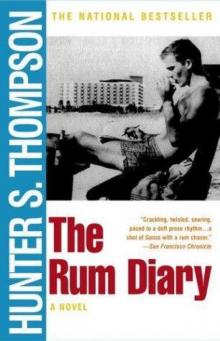 The Rum Diary
The Rum Diary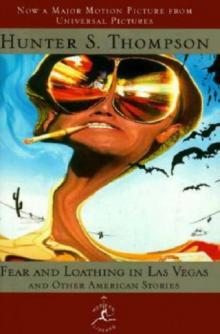 Fear and Loathing in Las Vegas and Other American Stories
Fear and Loathing in Las Vegas and Other American Stories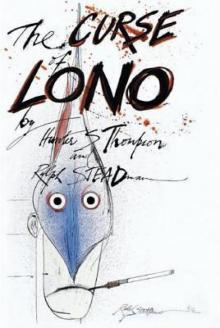 The Curse of Lono
The Curse of Lono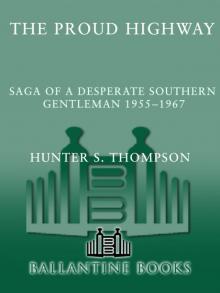 Proud Highway: Saga of a Desperate Southern Gentleman, 1955-1967
Proud Highway: Saga of a Desperate Southern Gentleman, 1955-1967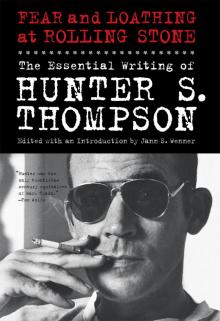 Fear and Loathing at Rolling Stone: The Essential Hunter S. Thompson
Fear and Loathing at Rolling Stone: The Essential Hunter S. Thompson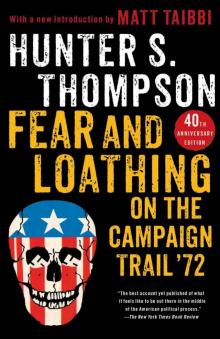 Fear and Loathing on the Campaign Trail '72
Fear and Loathing on the Campaign Trail '72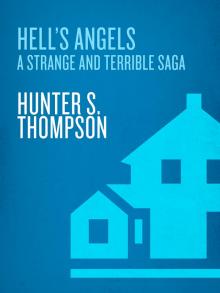 Hell's Angels: A Strange and Terrible Saga
Hell's Angels: A Strange and Terrible Saga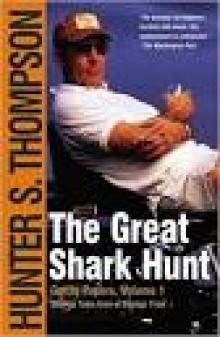 The Great Shark Hunt: Strange Tales From a Strange Time
The Great Shark Hunt: Strange Tales From a Strange Time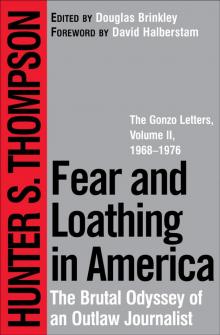 Fear and Loathing in America
Fear and Loathing in America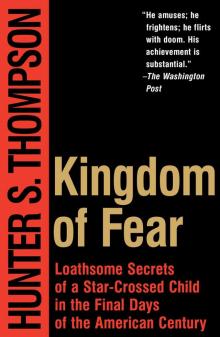 Kingdom of Fear
Kingdom of Fear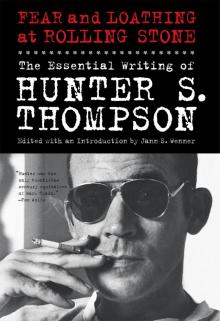 Fear and Loathing at Rolling Stone
Fear and Loathing at Rolling Stone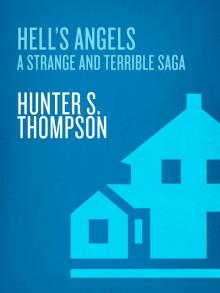 Hell's Angels
Hell's Angels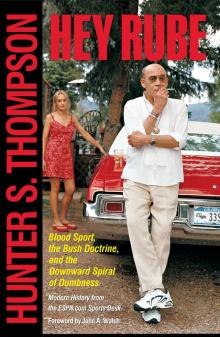 Hey Rube
Hey Rube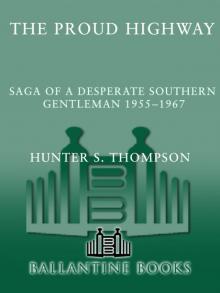 Proud Highway
Proud Highway